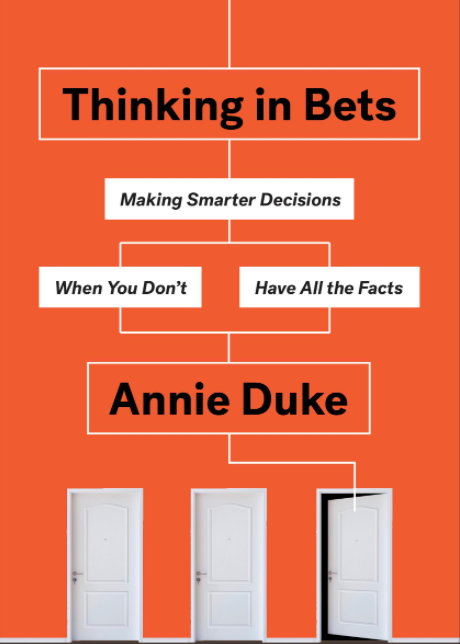
Behavioral psychology is going mainstream in American culture, from Michael Lewis’s “Moneyball,” to recent Nobel prizes won by behavioral economics giants Daniel Kahneman and Richard Thaler. While there has been a spate of recent books that discuss how we are “predictably irrational,” often these are long on theory, but short on practical solutions for overcoming our biases.
If you are looking for an applied framework for the newest cutting edge behavioral psychology, you should read “Thinking in Bets: Making Smarter Decisions When You Don’t Have All the Facts,” by Annie Duke. This book provides not only an overarching philosophy of decision-making, but also includes core elements of a decision-making system anyone can use, including a variety of practical hacks, techniques, and strategies for avoiding the psychological traps and biases that can trip us up.
Annie Duke is a professional you can rely on for this kind of insight. As one of the leading female money winners in the history of poker, Duke was for many years, quite literally, a professional decision-maker. Poker is an ideal context for exploring decision-making, since players constantly make many decisions, with little information, and get immediate feedback through money won or lost.
While much of Duke’s discussion is through the lens of poker, the book also draws from a huge diversity of sources, which makes for a rich reading experience. It is an intellectual smorgasbord: There are references to studies, academic research, quotes, books and TED talks, TV shows, sports, and more. Duke is a true polymath.
What did I like about the book?
The book explains how our biases systematically impede our decision-making and then provides meta-cognitive solutions — an approach to thinking about our own thinking.
Duke begins with our tendency to judge decisions based on how they turn out. In the world of poker, this is known as “resulting,” in which we believe results indicate the quality of our decision: If we succeeded it was a good decision, but if we failed, it was a bad decision. She uses the example of the Seattle Seahawks, who lost the 2014 Super Bowl, when they failed to run the ball, opting instead for a pass that was intercepted, causing them to lose the game. Worst call in football history?
No so fast. This analysis ignores the role of luck. When the most likely event does not take place, it does not always mean it was a poor choice – it could have been just bad luck, as with Seattle’s infamous pass (the previous interception rate was 2%). This insight moves us away from binary right/wrong thinking, and towards a probabilistic approach to interpreting outcomes – just like betting in poker.












Leave A Comment